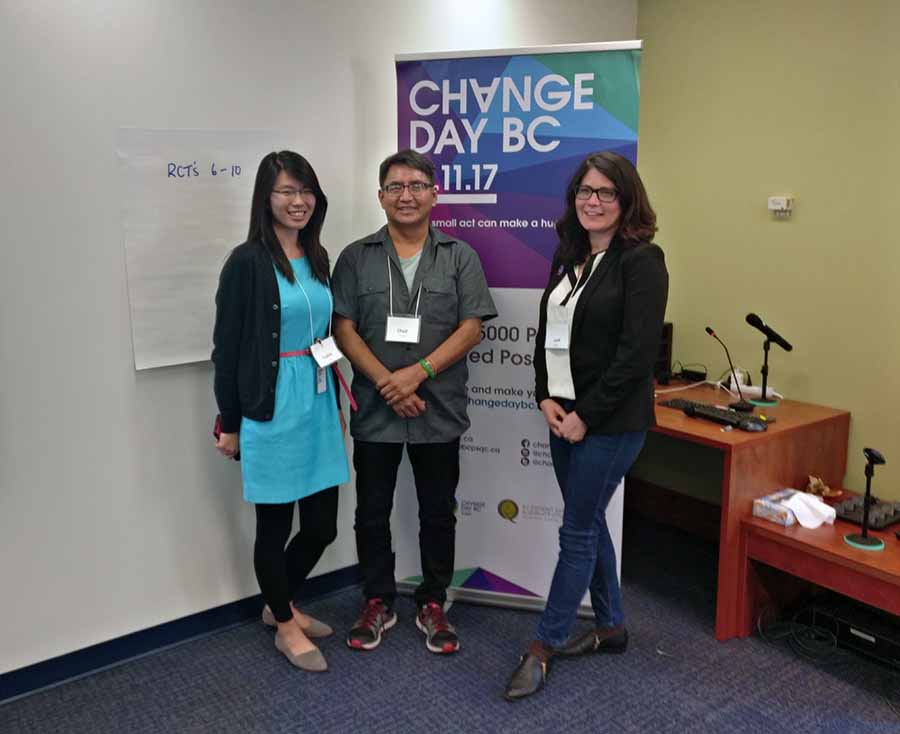Posted • Last updated
Categories: Improving Health Care, My Experience
Chad Dickie was one of two patient partners selected to participate in a Being an Effective Change Agent workshop offered by the BC Patient Safety & Quality Council in October. In this post he tells us why he decided to join the workshop and his main takeaways from this learning opportunity:
I was looking forward to attending my first-ever Change Agent workshop offered by the Council! As a part-time, mature student new to the field of Population Health & Social Policy, I wanted to know what makes effective, sustainable change in patient-centred care and learn new skills and processes for long-term change.
I’m especially interested in effecting change in the communities I’m part of or involved with, such as First Nations, chronic diseases, elders care and ageing, LGBTQ, cultural & community competencies, and patient-oriented research. I’ve been involved in some incremental changes in the past but nothing transformative and sustainable, so I was not sure if that was really what could be considered “change”.
Workshop Recap
The delivery of information at the workshop was fast-paced and the presenters were engaging and relatable. They shared relevant personal stories to highlight their main points when appropriate, something I especially appreciated, as it reminds me that we’re all patients at one time-or-another.
I felt nervous at the start but soon realized others must have been too (whenever a question was asked to the group, you could hear “crickets” – this in a room of almost 40 health care professionals!). Despite the initial anxiety, I was soon contributing to table and group discussions. Change is constant and in every area of life; again, a matter of perspective!
Though most of the content was geared to organizational change within health care provision, as an end-user of health care, my viewpoint was as valid as that of a person overseeing emergency medical technicians scheduling, clinical management design, or care facility management.
The day was active and productive. Each session had associated activities and worksheets that we completed within our table and shared with the room. If you shared you got some “swag,” like this card set I got:

My main takeaways from the workshop
The workshop was divided in four sessions, plus the lunch and refreshment breaks. My three highlights from the first session – Towards Possibilities: Being an Organizational Change Agent – were:
- “Disruption is the new normal”
- “How to respond by questioning existing ideas”: calls for challenging assumptions and “we’ve always done it like this” mindsets
- The chart below:

The second session – The Glue that Holds it Together: The Importance of Community and Building Alliances – had discussions about important work from different authors and many things I recognized I could use in Advocacy Coalition Framework of Policy Making to build stronger alliances and cohesive messaging. That was the most interesting part of the day for me!
After that, there was a presentation about the use of social media to spread health information, with valuable information about Twitter and its ability to reach huge numbers of people through distributive sharing, and I could see myself using social media platforms within my work and professional networks on a limited basis. Although each participant was asked to set up a Twitter account ahead of time as “homework,” I wish there was also a live demonstration of tweeting.
The third session – Saddle Up! Harnessing the Power of Resistance – provided valuable information on how to embrace resistance, listen to understand and the importance of “diversity of thought”. Three major takeaways for me were:
- Resistance is inevitable; learning how to engage it appropriately is a skill.
- The importance of creating space for difficult conversations that challenge my own assumptions
- Prochaska’s, DiClemente’s, & Norcross’ “The Stages of Changes”, which I first heard about in mental health and addictions, applies to organizational behaviour dynamics as well.
In the end of the day, Keep the Fire Burning: Motivation and Maintaining the Energy for Change was an appropriate ending session that reenergized me and made me think of the possibilities of changes and the need for self-care, both individually and organizationally. Energy and sustainability requires mobilization of emotional, cognitive and behavioural potential of an organization, as well as recognition of various types of good – productive and comfortable – and bad – resigned inertia and corrosiveness – energy.

There – that was my very interesting and valuable day of learning! I want to thank the facilitators for the great opportunity. And a big thank you to Maria Cortes, Program Assistant with BCPSQC for doing such a fantastic job with the setup and organization of the materials and other workshop related activities.
I would highly recommend the Being An Effective Change Agent Workshop to anyone in the health care field. Even if your organization is running “tickety-boo,” this valuable workshop will spark some ideas for progressive, iterative change for the better.
Author: Chad Dickie


